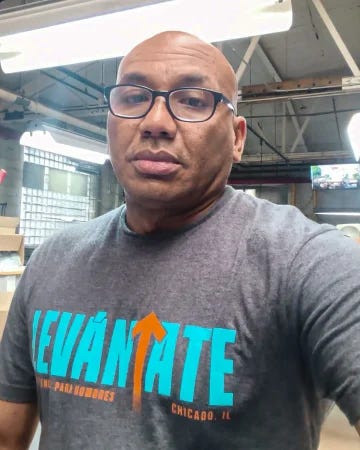Fear and Uncertainty: Migrants with Temporary Status Brace for Trump’s Crackdown
Venezuelan immigrants with TPS express anxiety over their future, while some focus on taking life one day at a time.
CHICAGO — For the past two years, Carlos Carpio has built a life in Chicago, a city he has grown to love. He has a steady job in a factory, rents an apartment, and has formed meaningful connections within the community. Sundays are reserved for church, where he finds comfort in his faith.
However, for Carpio, a Venezuelan immigrant living in the U.S. under Temporary Protected Status (TPS), the security he once felt has been replaced by fear and uncertainty following Donald Trump’s return to the presidency. With Trump’s promise to enact the most extensive mass deportation in U.S. history, Carpio, like many others, is left wondering what the future holds.
“There’s so much fear because of what Trump has been saying and now doing,” said Carpio, 50. “Since he took office, I’ve been living in constant anxiety.”
Carpio is one of approximately one million individuals granted TPS, a program allowing migrants to stay in the U.S. temporarily due to conflict or disasters in their home countries. While the Biden administration recently extended TPS protections for 18 months for migrants from several nations, including Venezuela, Trump has ordered a review of the program. His past efforts to end TPS suggest a renewed push to restrict it further.
A Community on Edge
For many Venezuelan migrants with TPS, fear has become a daily reality. While some choose to focus on the present, uncertainty lingers over whether they will be forced to return to a country still plagued by political instability and economic turmoil.
“I feel like everything I’ve worked for here no longer matters,” Carpio said, his voice filled with frustration and sadness.
Though legal challenges could arise if Trump moves to revoke TPS, he could also allow protections to lapse, making thousands vulnerable to deportation. However, Venezuela currently refuses to accept deportees from the U.S., further complicating the situation.
The anxiety has taken a toll on Carpio’s daily life. Once socially active, he now avoids public places, fearful of being confronted by authorities. He carries all his legal documents with him at all times and has changed his routines, limiting trips on public transportation and opting to go straight home after work. Even mundane tasks, such as visiting the bank, have become overwhelming experiences filled with paranoia.
At his factory job, conversations among migrant workers often revolve around Trump’s immigration policies, with whispers of what could come next.
Even church, once a place of refuge, now feels uncertain. With the Trump administration revoking policies that prevented immigration enforcement in places of worship, schools, and hospitals, Carpio and his friends worry about whether attending Sunday service is still safe.
“We are all afraid. We carry this fear and anxiety everywhere we go,” he said.
Living in Limbo
Daisy, a 36-year-old Venezuelan migrant who has lived in Chicago for two years, cherishes the life she has built in the city. “I love Chicago. This is where I want to be,” she said.
However, recent immigration changes have left her feeling unsettled. Since hearing about Trump’s new executive orders, Daisy admits to feeling “anguished” and longing for the peace of mind she once had.
“I’m scared to even step outside. I was terrified to go to work,” she said. “I’ve been praying to God for strength.”
Following the shifting immigration landscape has been exhausting for her. “I’m constantly questioning whether I’m safe or not,” she said, adding that she avoids unnecessary outings and adheres to a strict routine between home and work.
Other migrants are choosing a different approach, opting to live day by day rather than dwell on the uncertainty.
Jhovanny Jiménez, a 43-year-old Venezuelan migrant with TPS and an open asylum case, has dedicated his time to helping fellow migrants with legal paperwork. His Chicago apartment doubles as a workspace where he assists others with asylum applications and work permits. Despite the looming uncertainty, he remains steadfast in his purpose.
“We can’t allow fear to control us. We must remain committed to doing things the right way,” he said.
Jiménez, who fled Venezuela due to political persecution, knows that returning is not an option. “If I were to go back, I might not survive,” he said, his voice heavy with emotion.
Holding Onto Hope
Oscar Peñalver Sanchez


